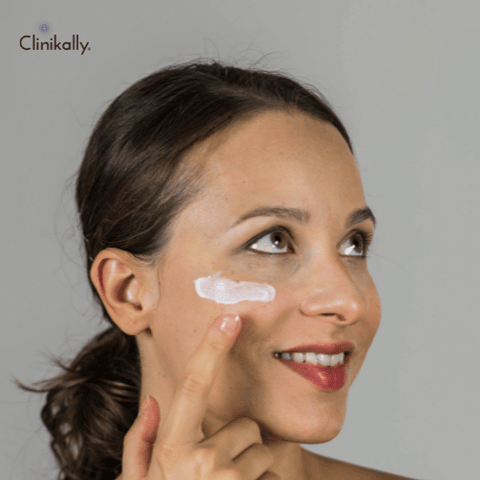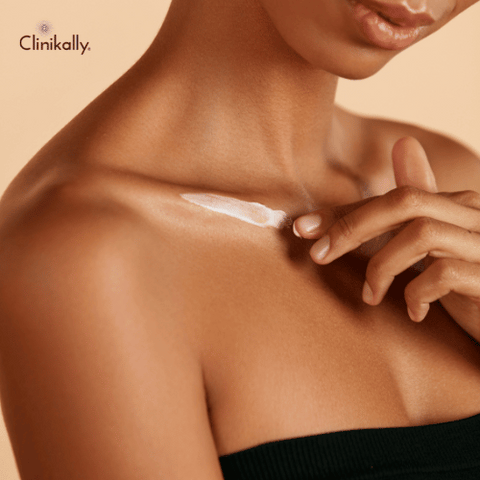Xanthan gum is a polysaccharide that is created when a particular bacterial strain ferments simple sugars. Its extraordinary ability to stabilise and thicken liquids makes it a fantastic ingredient for skincare and personal care products. The versatile and advantageous ingredient xanthan gum can improve the consistency, texture, and efficacy of skincare and personal care products. While it may not be as glamorous as other skincare ingredients, this one is well worth considering for its numerous benefits.
Demystifying Xanthan Gum in Skincare

Natural Xanthan gum is frequently used in skincare and cosmetic products as a thickener, stabiliser, and emulsifier. It is a polysaccharide derived from carbohydrate fermentation, primarily corn, soy, or wheat. At low concentrations, xanthan gum is a high molecular weight polymer that is highly water soluble and can form highly viscous solutions. It is frequently used to increase spreadability and skin absorption, prevent ingredient separation, and enhance product consistency and texture in skincare formulations. Xanthan gum has moisturising and conditioning properties in addition to thickening and stabilising effects on the skin. It creates a shield-like layer on the skin's surface to help it retain moisture and stop transepidermal water loss (TEWL), which can result in dryness and dehydration.
What is Xanthan Gum?
The food industry frequently uses natural xanthan gum as a thickener, stabiliser, and emulsifier. The bacterium Xanthomonas campestris produces a type of carbohydrate called a polysaccharide by fermenting simple sugars. Xanthan gum is an effective ingredient in various food products, including sauces, dressings, and baked goods, because it is water soluble and can create highly viscous solutions at low concentrations. A wide range of other products, including medicines, cosmetics, and personal care items, also use xanthan gum outside of the food industry. Xanthan gum is frequently used as a thickener and stabiliser in skincare and cosmetic products to enhance the formulation's texture and consistency, prevent ingredient separation, and enhance the product's spreadability and absorption on the skin. It is a well-liked component in skin care formulations because it has moisturising and skin-conditioning qualities.
How Xanthan Gum is Produced
The bacterium Xanthomonas campestris is used in the fermentation process to produce xanthan gum. The bacteria are first grown in a nutrient-rich medium, which is typically made of corn, soy, or wheat. As a by-product of their metabolism, the bacteria produce xanthan gum. Long chains of glucose molecules are produced by the bacteria during fermentation, and these chains are later altered by enzymes to produce the finished product known as xanthan gum. The finished item has a unique molecular make-up that bestows thickening, stabilising, and emulsifying qualities. It is a highly viscous, water-soluble polysaccharide. After fermentation, the xanthan gum is purified, dried, and ground into a fine powder. The powder is then packaged and shipped to producers, who use it in various goods like skincare, personal care, food, and medications.
Xanthan Gum's Role in Skincare Products
As a thickener, stabiliser, and emulsifier, xanthan gum is essential in many skincare products. It is commonly used to improve the texture, consistency, and overall performance of formulations such as creams, lotions, serums, and gels. Xanthan gum, as a thickener, can help give products a smooth, creamy texture and keep them from separating or settling over time. It can also help improve product spreadability, making it easier to apply and absorb into the skin. When products are exposed to heat, light, or air, xanthan gum acts as a stabiliser to stop product deterioration or potency loss. It can also help products last longer by inhibiting the growth of bacteria and other microorganisms. As an emulsifier, xanthan gum can aid in the combination of oil and water-based ingredients in formulations, resulting in stable, homogeneous products that are easy to apply and distribute evenly.
The Various Benefits of Xanthan Gum in Skincare

When used in skincare products, Xanthan gum has several advantages. Here are a few examples:
-
Thickening and Stabilising: Xanthan Gum is frequently used in skin care products as a thickener and stabiliser. It assists in giving products a more preferable consistency and stops them from clumping or segregating.
-
Moisturising: Xanthan Gum is also recognized for its moisturising qualities. When added to skincare products, it can help to keep the skin hydrated and prevent dryness.
-
Improving Texture: Xanthan Gum can help to improve the texture of skincare products, making them smoother and more pleasant to use.
-
Enhancing Product Performance: Other ingredients in skincare products can perform better when Xanthan Gum is added. It can help active ingredients to penetrate the skin more effectively and can also enhance the delivery of other beneficial ingredients.
-
Natural and Non-Toxic: The use of Xanthan Gum in skincare products is safe because it is both natural and non-toxic.
-
Suitable for Sensitive Skin: Xanthan Gum is generally well tolerated by all skin types, including sensitive skin. It is a common ingredient in skincare products for people with sensitive skin because it is non-irritating and non-sensitizing.
Enhancing Texture and Consistency
A common thickening and stabilising ingredient in skincare products is xanthan gum. It is especially useful in emulsions like lotions, creams, and serums because it improves their texture and consistency. When xanthan gum is added to a formulation, it increases its viscosity, making it easier to spread and apply to the skin. Additionally, it aids in preventing the separation of the ingredients, ensuring that the final product is consistently well-mixed over time. This improves the user experience and the product's overall effectiveness.
Emulsifying and Stabilising Formulations
Xanthan gum is a great emulsifier in addition to its thickening and stabilising abilities. It can help to blend water and oil-based ingredients together, creating a smooth, uniform product that feels pleasant to use. This makes it an ideal ingredient for skincare formulations that contain a mix of water-soluble and oil-soluble ingredients. To keep emulsions from degrading over time, xanthan gum is also effective at stabilising them. This is important for skincare products that are designed to have a long shelf life, as it ensures that the product remains effective and safe to use for the duration of its shelf life.
Supporting Hydration and Skin Smoothing
Because of its unique ability to bind with water molecules, xanthan gum is an effective ingredient in skin care products for enhancing hydration and skin smoothness. It forms a thin, transparent film on the skin's surface that aids in moisture retention, keeping the skin hydrated for longer periods. Additionally, xanthan gum is a powerful humectant with a high molecular weight that can draw moisture from the environment to the skin's surface to help hydrate it. Its hydrating and smoothing qualities make it a popular ingredient in moisturisers, lotions, and serums.
Suitable for Sensitive Skin and Clean Beauty
Xanthan gum is frequently found in skin care products made for sensitive skin because it is thought to be safe for it. It is derived from natural sources and is commonly found in natural beauty products. Because xanthan gum is non-toxic and does not irritate the skin, it is a popular ingredient in gentle and natural skincare formulations. Due to its plant-based origins and lack of animal testing, it is also appropriate for vegan and cruelty-free products.
Incorporating Xanthan Gum into Your Skincare Routine

Xanthan gum is a common thickener and stabiliser in the food industry, but it can also be beneficial in skincare products. If you're thinking about incorporating xanthan gum into your skincare routine, keep the following points in mind:
-
Benefits: Skincare products that have been thickened and stabilized with xanthan gum are easier to apply and are less likely to separate or settle. It can also create a smooth, silky texture and help to improve the spreadability of the product.
-
Compatibility: Most people generally consider xanthan gum to be safe and non-irritating. However, as with any new skincare ingredient, it's important to patch test first to ensure you don't have an adverse reaction. It's also a good idea to avoid using xanthan gum if you have a known allergy or sensitivity to any of its components.
-
Formulation: To incorporate xanthan gum, add it to the water phase of your formulation when creating your skincare products. It's important to remember that xanthan gum can be challenging to completely dissolve, so you might need to use a blender or mixer to get a smooth texture. If you're purchasing a skincare product that contains xanthan gum, make sure to follow the manufacturer's instructions for use.
-
Amount: The amount of xanthan gum you use will depend on the desired consistency of your skincare product. As a general rule of thumb, you'll typically want to use between 0.1% and 1% xanthan gum by weight. Using too much xanthan gum can make the product feel sticky or gummy, so it's best to start with a small amount and adjust as needed.
-
Storage: Because xanthan gum can be sensitive to pH and temperature, it's critical to keep your skincare products cool, dry, and out of the sun. Make sure to follow any storage instructions provided by the manufacturer.
Identifying Xanthan Gum in Product Labels
Xanthan gum is a common ingredient in many skincare products and can be found on the product label's ingredient list. The name "xanthan gum" or the E number E415 are the best ways to identify xanthan gum on a product label. Always consult a dermatologist or other healthcare professional if you are unsure whether a product contains xanthan gum or if you have any concerns about a particular ingredient.
Understanding Xanthan Gum's Compatibility with Other Ingredients
Most other ingredients found in skincare formulas are thought to work well with xanthan gum. It is important to note, however, that some ingredients may not work well with xanthan gum or may necessitate additional formulation considerations. When it comes to xanthan gum's compatibility with other ingredients, keep the following points in mind:
-
pH: The pH range of 6 to 8 is where xanthan gum performs at its best. Xanthan gum may not function as well or may become unstable if the pH of a formulation is either too low or too high. In general, it's wise to stay away from using xanthan gum in formulations with a pH of either 4 or 10.
-
Surfactants: Surfactants are frequently used to produce foaming or cleansing properties in skincare formulations. Some surfactants, such as sodium lauryl sulfate (SLS), can reduce the effectiveness of xanthan gum and may cause it to clump or form gels. If you're using xanthan gum in a formulation with surfactants, it's important to test for compatibility and adjust the concentration of xanthan gum as needed.
-
Salts: Xanthan gum is sensitive to salts with high concentrations, like sodium chloride. A high salt content in a formulation may cause xanthan gum to gel or clump together. It's critical to test for compatibility when using xanthan gum in salt-containing formulations and to adjust the xanthan gum concentration as necessary.
-
Other thickeners: Carrageenan, agar, and guar gum are a few others that are frequently combined with xanthan gum. Though xanthan gum generally gets along with other thickeners, it's still a good idea to test this and change each thickener's concentration as necessary.
-
Active ingredients: Xanthan gum is frequently used in skincare formulations and is generally regarded as compatible with various active ingredients. However, it's always a good idea to test each active ingredient for compatibility and adjust the xanthan gum concentration as necessary.
Safety and Allergy Considerations
Regulatory agencies such as the US Food and Drug Administration (FDA) and the European Union have approved using xanthan gum in skincare products. However, as with any ingredient, there are some safety and allergy concerns to be aware of:
-
Eye irritation: If xanthan gum gets in contact with the eyes, it may irritate them. You should immediately flush your eyes with water if a product containing xanthan gum gets in them.
-
Skin irritation: Although xanthan gum is typically thought to be non-irritating, it can still irritate some people's skin. After using a product containing xanthan gum, stop using it and see a dermatologist if you notice any redness, itching, or other symptoms of skin irritation.
-
Allergies: Xanthan gum is made from the bacterium Xanthomonas campestris, which in some people can lead to an allergic reaction. You may want to avoid xanthan gum-containing products if you have a known allergy to this or a related bacteria.
-
Ingestion: Xanthan gum is safe for topical use, but it should not be ingested. If ingested, it can cause gastrointestinal upset, such as bloating, gas, or diarrhoea.
-
Interactions with medications: Xanthan gum can interact with certain medications, such as blood thinners or cholesterol-lowering drugs. If you take any medications, it's important to talk to your healthcare provider before using skincare products containing xanthan gum.
The Growing Importance of Xanthan Gum in Skincare and Cosmetics

Xanthan gum is being used more frequently in skin care and cosmetic formulations as a result of its unique properties and benefits. Here are some explanations for why xanthan gum is becoming more significant in the beauty sector:
-
Texture and viscosity: Xanthan gum is an efficient thickener and stabilizer, so it can aid in giving skincare and cosmetic products the desired texture and viscosity. It can give products a consistent texture, make them feel silky and smooth, and keep the ingredients from separating.
-
Moisturization: Xanthan gum can help by forming a barrier on the skin that aids in retaining moisture, which can enhance the moisturising properties of skincare products. This may contribute to the improvement of the skin's general hydration and appearance.
-
Compatibility: Xanthan gum is a versatile ingredient for formulators because it mixes well with various other ingredients frequently used in skin care and cosmetic formulations.
-
Safety: Xanthan gum has received approval from regulatory bodies including the European Union and the US Food and Drug Administration (FDA) and is generally regarded as safe for use in skincare and cosmetic products.
-
Natural and sustainable: Xanthan gum can be produced sustainably and is derived from natural sources like the fermentation of soy or corn sugar. This makes it a desirable choice for customers looking for sustainable and natural skincare and cosmetics products.
Xanthan gum is a unique ingredient that has unique qualities and advantages that are making it a key component in the skincare and cosmetics industries. Xanthan gum is probably going to become more and more popular as a main component in cosmetic formulations as consumer demand for natural and environmentally friendly products rises.
















